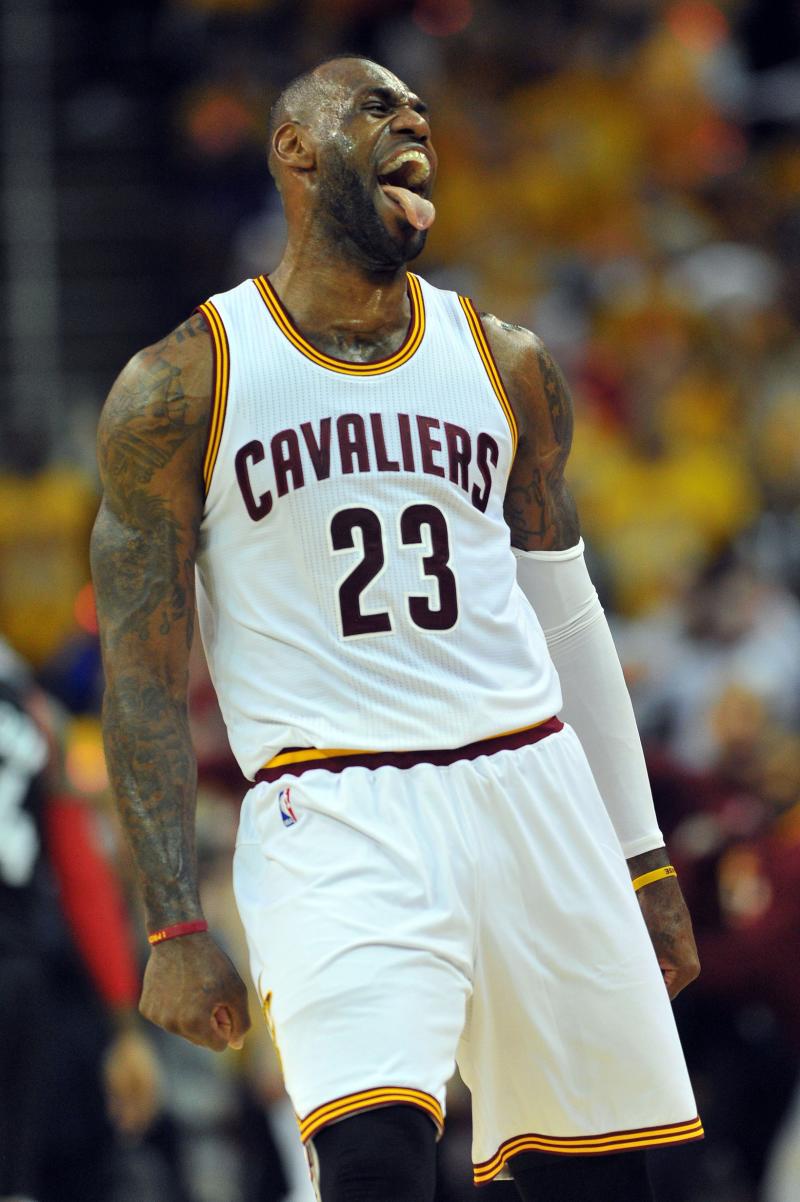
Greatness is not a zero-sum game.
This should be obvious, but judging by how people have reacted to Stephen Curry’s meteoric rise, maybe it isn’t. So perhaps it’s worth getting this out of the way right up front: Celebrating Curry’s unprecedented accomplishments should in no way take away from what LeBron James has done, and continues to do. One’s greatness does not diminish the other’s. And even if Curry places a second championship trophy alongside his second MVP, he still must share the throne.
James has played 13 seasons, and will—barring the entire Toronto Raptors team being irradiated or something—appear in his sixth-straight NBA Finals. Michael Jordan never did that, neither did Magic Johnson. If James wants to find someone else who’s experienced it, he’ll have to track down a very old former Boston Celtic, one who last played in 1966.
with LeBron, the unprecedented has become expected. We see him doing the mere ludicrous, yawn, and wonder why he hasn’t done the impossible yet.
Point being that Curry isn’t the only player out here doing unprecedented shit. James has switched teams twice this decade and made the finals in his FIRST season with BOTH teams. But with LeBron, the unprecedented has become expected. We see him doing the mere ludicrous, yawn, and wonder why he hasn’t done the impossible yet. Five straight finals appearances, sure, but only two rings? Pssh.
There is a larger problem in sports where we aren’t willing to accept things at face value. We tend to compare players to their potential (as we see it) rather than see them for who they are. This is how someone like Derrick Coleman, who averaged 16.5 and 9.3 over a 15-year career, is seen as a disappointment (because he was an overall No. 1 pick) rather than a success. This, of course, also depends how one defines success.
In the post-Jordan era, that definition has become very narrow: Make the finals, and never lose. Oh yes, and be your team’s best offensive AND defensive player. But it’s really Jordan’s six championships in six finals appearances that ruined it for everyone. Going by those standards, James was a failure following his first finals appearance in 2007. And, depending how things go in Oklahoma, Curry might be seen as a failure as well.
But greatness in sports was never this rigid before. Jerry West lost in the finals seven times before finally winning one, and he became the NBA logo. Magic Johnson won in his first two trips then lost twice, earning the nickname “Tragic Johnson.” Larry Bird made four finals appearances between 1984 and 1987, winning alternate years, before his Celtics were rudely supplanted by the Bad Boy Pistons. And of course there are Tim Duncan’s non-dynasty dynasty Spurs, who never managed consecutive titles and only made back-to-back finals once during their five-title run.

Is it possible that we’re judging greatness wrong? Probably. After all, winning the finals is dependent on so much. Expecting an individual to guarantee team success seems like a lot. As former Bulls GM Jerry Krause once said, organizations win championships. Simply getting to the finals year after year is the real climb. Losing at the end hurts—just ask West—but it shouldn’t negate all the work that went into just getting there. Again, greatness is not a zero-sum game.
If it seems odd to be discussing LeBron’s legacy when he still appears to be very much in his prime, it is. But James has never been much for doing things the normal way. He’s already played more career playoff games than Jordan, more career minutes than Magic or Bird, yet he’s still dunking the ball hard enough to deform it. By the end of this season, there were just nine active players who have played more NBA minutes than James: Kevin Garnett, Kobe Bryant, Tim Duncan, Dirk Nowitzki, Paul Pierce, Vince Carter, Joe Johnson, Andre Miller, and Jason Terry. That’s it. Two years from now, James might be alone atop the list. He’ll be 33 years old.
Point being, he’s nowhere near finished. Not even close. It came out this week in a GQ story that James’s recently inked lifetime deal with Nike may wind up paying him in excess of $1 billion, if Maverick Carter’s non-answer answer is to be believed. There are a lot of factors that will go into whether the deal is worth it—whether Curry can continue to elevate Under Armour for one, and whether James’s past models can one day be successfully flipped into a retro play, for another. This is neither the time nor the place to debate that. Suffice it to say that both sides left the table happy. And a company like Nike doesn’t make that deal unless they feel it’s in their best interests to do so. They didn’t get to where they are by giving money away for services rendered. They expect more.
In this, his 13th season, James finished with a PER of 27.5, played 2,700 minutes, averaged 25.3 points, 6.8 assists and 7.3 rebounds per game. It is, perhaps, worth noting that’s more points and assists than Scottie Pippen ever averaged in a single season. You know how many seasons Larry Bird had a PER higher than 27.5? Once. James finished third in MVP voting behind Curry—who received all 130 first-place votes—and ultimate two-way weapon Kawhi Leonard. This was James' eighth consecutive top-three finish. Whenever it’s announced, he will be named to his ninth straight All-NBA First Team.
when you tune into Game 2, pretend you’re watching LeBron James for the first time. The miracle continues. We are still witnesses.
If LeBron is declining, it’s hardly noticeable. Just watch him explode for a dunk or fire a cross-court, cross-body pass to someone he shouldn’t have even seen. If his athleticism has diminished at all, it’s just gone from “god” to “demi-god.” But people like new things and new heroes. Even Jordan knew that, as he watched MVPs be awarded to Charles Barkley and Karl Malone. He vanquished each in the finals, ending both seasons on top.
Maybe it’s James’s turn to write that chapter. He had the chance last year, but even his finals MVP-worthy heroism wasn’t enough to lift his injury-decimated Cavaliers over Curry’s Warriors. This year could be different. Playing at full strength, the Cavaliers swept the Pistons, swept the Hawks, and show no sign that they will be even remotely slowed by the Raptors. (James sure wasn’t in Game 1, as he shot 11 of 13 for 24 points in just 28 minutes.) If the Warriors manage to dispatch the Thunder, they will face a far different, far superior opponent in the finals rematch.
If the Cavaliers win, if James is named NBA Finals MVP, new narratives will form. He will have finally won his championship for “the Land.” Mission accomplished. He will rise higher in the NBA pantheon in the eyes of many. But what will really have changed? If the Cavaliers do win, will it be because of some shift in James’s game, or will it just be because Kevin Love and Kyrie Irving were finally healthy? And, if it’s the latter, why should a finals win or loss affect our perception of James at all?
Humans are funny creatures. See miracles regularly enough, we start to accept them as routine. It takes a conscious effort, a hard reset of sorts, to remember what was so amazing to begin with. So when you tune into Game 2, pretend you’re watching LeBron James for the first time. The miracle continues. We are still witnesses.

